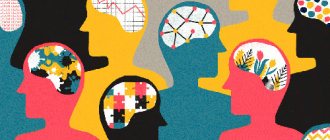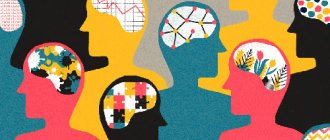Nikolai Naritsyn, psychotherapist
Women, oddly enough, find it easier to admit to physical imperfections than to admit to intellectual failures. And it begins: “I will never be happy, because I have...” - and then each one brands her hated part of the body.
Woman.ru asked an expert, famous psychotherapist Nikolai Naritsyn, about why we tend to consider our shortcomings the reasons for our failures.
They won’t hire you - no wonder, with such legs! Men don’t pay attention - of course, I’m fat! My husband left for someone else - of course, I would like breasts like that! And the reasons for such troubles are deep within yourself, in your personality structure, in your communication tactics. But, oddly enough, it is easier for women to admit to physical imperfections than to admit to intellectual failures.
Many plastic surgeons have grateful but repeat clients!
From hatred to neurosis
Such a hateful attitude towards oneself (or part of oneself) very quickly takes on the character of a neurotic state. In most cases, the cause of worries is precisely “imaginary”, far-fetched external shortcomings of one’s own. You just need to blame your own psychological troubles on someone or something, to find the “exact reason” for your own failures. In general, in psychology and psychotherapy, the concept of “dysmorphophobia” is interpreted a little loosely - as “fear of one’s own body, fear of it.” A person, being in such a state, initially considers his body ugly, unattractive - and again, often without any logic. He is afraid of both the body itself and the assessments of others - and as a result, he wages a real, irreconcilable and cruel war with his appearance. But there are never winners in this war, as in the fight against one’s own personality.
Why is this happening
If the main “capital” of any woman is her appearance and women are greeted by their clothes, then what conclusion can a young girl (or a not very psychologically literate adult woman) draw if she has continuous failures in her life, if there is no happiness in anything? It’s clear that she probably doesn’t think about whether she knows how to communicate, does she know what she needs in life, is she looking for prospective life partners? No, it's all very complicated. The easiest way is to tell yourself that I don’t have the same nose or the same weight - then everything will become clear, including what to fight! In principle, you can hate anything about your appearance. And having corrected one thing, you immediately become embittered by something else.
Good dividends are collected from those suffering from dysmorphophobia by those who sell all sorts of drugs for weight loss, engage in hair transplantation from place to place, and offer various methods of rejuvenation and body correction, including surgically...
Self-hatred - and no compromises. How do people with borderline personality disorder live?
Borderline personality disorder (BPD) is considered one of the most difficult mental disorders to treat.
The International Classification of Diseases identifies the following symptoms of BPD:
- disorder of self-perception, goals and internal aspirations;
- chronic feeling of emptiness;
- tendency to become involved in tense and unstable interpersonal relationships
- self-destructive behavior, including suicidal gestures and attempts.
Sounds not fun, right? The disorder is difficult to treat; psychotherapy is the main remedy.
We talked to two girls who were diagnosed about how they live with BPD, and asked a psychotherapist how to help such people.
Lyuba, 26 years old, IT specialist, Germany
— How are you feeling now?
“My condition is difficult to describe in one word. In general, I have more than one mental illness. There are problems with borderline personality disorder and anorexia, but otherwise I am stable - thanks to medications and psychotherapy.
— Before the conversation, I asked you to express the essence of BPD in one phrase. Your answer is the inability to build relationships. How does this manifest itself?
— I cannot be stable in any relationship: romantic, friendly, work. I can't see everything in an adequate light because I only see black and white. Either everything is great, or everything is very bad, and this changes instantly. If today I idealize a person and I develop an unhealthy dependence on him, then tomorrow it can go away with the snap of a finger, because of nonsense: I said something wrong, did something wrong - and immediately became enemy number one. Or it becomes suddenly boring. The first crush passes, and when everyone else’s normal relationships begin, they end for me.
— Is chasing passions a way to correct emotional instability?
— No, rather, emotions are like drugs for us. People with BPD often use alcohol and drugs, are often addicted to adrenaline and other addictive things - we want to fill ourselves with some emotions, but not because you are unstable, but because you don’t have these emotions. You feel an emptiness inside and you shove everything there: different people, some activities, alcohol, etc.
— What type of therapy are you undergoing to adapt to BPD?
— Now I’m changing psychotherapist. I am changing cognitive behavioral psychotherapy to the emotional subtype of cognitive behavioral therapy, that is, I will learn to work with emotions.
— Is there stigmatization of mentally ill people in Germany? How do your friends react when they find out that you have a disorder?
— In Germany there is no stigmatization, but my Russian colleagues also know about this and are loyal.
I'm generally a fan of fighting stigma. I don’t hesitate to talk about the fact that I have mental illnesses; all my colleagues and friends know this. At conferences within the company, I read reports on mental illness and try to educate as many people as possible. In particular, that’s why I’m giving this interview, to remove the stigma of the disease. I want people who know me as a successful person, or don’t know, but in principle understand that I am a successful person - I work in a large company, get good money, live in a separate apartment - to realize: people with mental illness can achieve much, this is not the end of life.
— What would be challenging in a relationship for the partner of someone with BPD?
— I say without embellishment: everything will be difficult: from everyday trifles to relationships in general. It's difficult for me to talk about this topic as I have never had a successful long term relationship except for my only one and that was with a narcissist that lasted 2.5 years. A person with narcissistic personality disorder will always be attracted to a person with BPD. Our disorders complemented each other very harmoniously. And unfortunately, they tormented both of us. But as a fact, it was the longest union. I have never done this with healthy people. Therefore, I cannot give any advice here and, to be honest, I would like to receive it myself.
— One of the symptoms is identity disorder. How does it feel?
— It feels like you have no personality, no habits of your own. Until I was 25, I didn’t even know what I liked to eat. Living with a person, I adapted to his eating habits and daily routine. If I live with an owl, then I lie down and get up like an owl, and vice versa. Now I live alone, and it’s very difficult for me. It often happens that I cannot occupy myself with anything. Panic sets in, because I can’t be alone, I just feel bad alone with myself. In this regard, I have many friends and acquaintances with whom I spend time.
— Are you trying to fill yourself with other people?
- Not other people, but parts of the personalities of others. You just don't have your own personality and tear off pieces from everyone else. Therefore, I often adapt to people, I behave in such a way that they are pleased. Essentially, these are unconscious manipulations. Now I work a lot with a psychotherapist and understand better when I am manipulating. And I stop it.
— Can you find positive aspects of BPD?
- No (laughs). There is definitely nothing good about this. Everyone thinks it's so cool because you're so eccentric and unusual. But it's terrible and makes you suffer. And seeing others suffer because of you, you suffer even more. Living with BPD is possible, but it is hard. Psychotherapy is definitely needed. Medicines do not help here, except to calm you down during exacerbations.
Anya (name changed), 22 years old, Russia
— What is your mental state at the moment?
— Now the situation is in limbo. Anxiety takes its toll. But sometimes you manage to look “from the outside,” and then things don’t look so bad.
— Are you afraid of stigmatization, have you encountered it?
- Yes. Since childhood, I have felt alienated. I still don’t accept my impulsiveness and sudden aggression, but I grew up in a constant feeling of guilt. When I am frank with people and share my experiences, I appear to them to be soft-hearted, lazy, as if I had invented something for myself to arouse pity. This is what it looks like from the outside, and it causes even more self-hatred.
— When did you realize that something was wrong? How was the official diagnosis made?
- After school. Before that, there was a dark period: I didn’t know what to do with myself, I deliberately looked for danger, got involved with bad people, walked alone at night - just so that something would happen to me. I was just lost.
But one day I attended a lecture “The Phenomenon of Suicide in Philosophy and Psychology,” which was given by a practicing psychotherapist. The topic was close to me. I often thought about suicide during exacerbations. After the lecture, I decided to go to the doctor, but I couldn’t find the right words - I started crying, but at the same time I felt that this particular person knew what was happening to me. He understood everything and handed me a business card, asking me to contact him. I was pleased by his responsiveness.
It was not possible to make an appointment with him right away due to his busy schedule. Full of shame for myself and self-hatred, I went to another “specialist.” At the first appointment, he pointed out to me how, according to him, I was behaving inappropriately, and was generally arrogant. I wasn’t surprised then, because I was already used to being guilty. But now it makes me wildly angry that such people aggravate the situation of patients who had difficulty deciding to be frank. I’m not talking now about his skills as a specialist, because he was the one who gave me the diagnosis, but emotional pressure here is unacceptable. The diagnosis helped me be more attentive to my condition.
— How does your disorder affect your interactions with people?
- Oh, I’m one of those quiet “border guards” who have all their experiences inside. In appearance I am welcoming and friendly, everyone is used to seeing me cheerful. This makes it even harder for me, but the fear of being alone leads to complete confusion. It’s like I’m a nobody if no one is around, and it doesn’t matter who that “someone” is: he may not be close to me at all. Therefore, in my circle there are many friends who are not similar to each other. And that's why I allow myself to be neglected.
My emotional state changes easily. The morning can start with depressive thoughts, then I get distracted and find joy, then - in an instant - I fly into a rage, I can’t control myself, I behave defiantly, loudly, and get into trouble.
People are pleasant to me, they arouse my sincere interest. From a distance, I can be happy for them, I accept everyone as they are. This is how I attract people. But if you want to get to know me better, it will take time for trust to arise between us. Because by default I see those around me as offenders, I think up nasty things for them, and I am extremely suspicious. And I hate this about myself too.
— Have you done self-harm?
— Auto-aggression is also a form of self-harm. There was also alcohol, drugs, a deliberately destructive lifestyle, relationships with people who torment you. I hit myself on the head, I hit walls to punish myself.
— How do you adapt? Are you in therapy?
— During a difficult period, I went to a psychotherapist, he said that we would just talk. Along the way, I took tests, tracked my condition, shared my secrets and found support, for which I am very grateful. He recommended literature on my topic, and after studying it, I gained hope for recovery.
Now I don’t go to appointments, but I already know how to cope with what used to be terrifying. Step by step I am moving towards transformation.
— What is most important to you about working with BPD?
- The ability to separate your destructive feelings from reality. Understanding that my perception is limited and often to my detriment. I've just started, there's still a lot to learn. Because it’s very difficult to distinguish this, you can’t read something like this in a book and you won’t understand: “Oh, that’s how it is, now I’ll know.”
— How will you know that you have recovered?
“The moments when I felt like myself, felt uplifted and energetic, were the highest happiness for me. So when I accept myself and express myself freely, I will know that I have succeeded.
Expert comment:
Yuri Kalmykov, psychotherapist, candidate of medical sciences
Borderline personality disorder is not a death sentence. This can rarely be said about mental illnesses; it is always possible to provide minimal support to people with them. It all depends on the severity of the disorder: in mild cases, people learn to live with it themselves, adapt intuitively or by reading special literature, and provide self-help. In severe cases, it is impossible to do without the intervention of a specialist.
The main constructive skill for BPD patients is the ability to see the undertones of life, to see compromises, and not just extremes. The romantic partner of a person with BPD may be advised to be more tolerant of their partner's personal boundaries. It is important not to take on the role of a specialist, but simply to be there, especially in difficult moments.
And plastic is not omnipotent...
Plastic surgeons say that patients endure all the suffering surprisingly steadfastly. It’s clear - they are moving towards future (in their opinion) happiness! They'll make breasts like that sex bomb on TV (whom my husband has been staring at lately), give themselves plump lips or get rid of wrinkles - and please, all the blessings of the world are at their feet (at least the dreamed-up female happiness for sure) ... And when this doesn’t happen after the operation, the unfortunate people experience such a feeling of disappointment!
Because of this, the patient may even begin to experience postoperative complications: when he realizes that all this did not help him, the body on an unconscious level may begin to reject the inserted implant, or there will simply be no incentive to comply with the postoperative regimen... And then he will begin to blame the doctors – but dislike for your body cannot be corrected by any plastic surgery!
Many surgeons, by the way, have grateful clients, but... constant ones: they say, doctor, you fixed my ears, but there was no happiness. Let's now fix the nose, and now the cheeks, and now the lips, chest, legs... So they reshape themselves - it's the same thing, only extended over time. And such a patient will be incomparably more disappointed when he realizes that all his transformations have led to nothing.
In our achievements
Dreams abandoned, talents buried in the ground.
“Because we don’t love ourselves enough, it’s difficult for us to achieve our goals: we don’t take our dreams seriously, we don’t dare to fulfill our desires, we simply don’t give ourselves this opportunity,” notes Charles Roizman.
We always put off until later the life we would like to lead: we feel neither worthy of happiness nor capable of it.
And then we either console ourselves or engage in self-sabotage. And yet we never realize our underestimated potential. Boredom and the feeling that we are not living our own lives are sure signs of self-hatred that we do not recognize. To cope with our disappointments, we convince ourselves that no one ever does what they want in life.
Prevention measures
What to do? You have to love yourself. Firstly, if you don’t love yourself, who will want to love you (and in particular your body?) And secondly, if you want to become loved, desired, dear to someone - what can you give him, what kind of love and tenderness, if you don’t have it yourself?
Strictly speaking, this is only one step in solving such problems. But in many cases the first one is the main one. After all, you can throw away a lot of money trying to change your figure and firmly believing that your life will immediately change. But believe me, that won't happen. First of all, treat your body kindly. Love him, and the rest, even if not immediately, will follow! Of course, you need to learn a new attitude towards yourself. But in any case, it is more effective and healthier than going on a diet!
In our relationship
Reproduction of violence, difficulty creating intimate space.
Because we are not aware of what has been done to us, we risk, without noticing it, in turn being inattentive, blaming, suppressing and humiliating partners, children, colleagues... “It is the violence that we reproduce that limits our ability to love others in the same way.” as they are, and show ourselves as we really are.
That is, ultimately create intimacy.” We hide behind (too) positive self-images (sweet, ideal, loyal) or too provocative ones (“I am who I am whether you like it or not,” “I value my freedom too much to get involved with anyone”). . These positions allow us to keep others at a distance, but also reveal deep-seated self-doubt.











